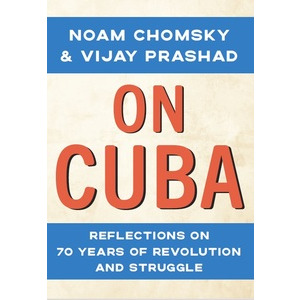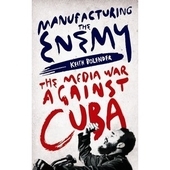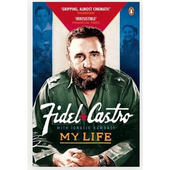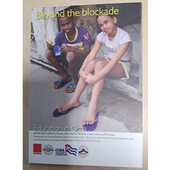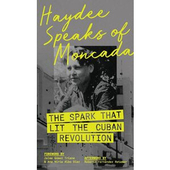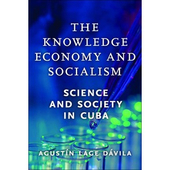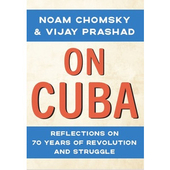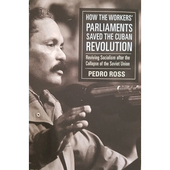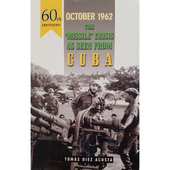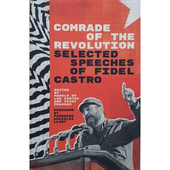Review of book:On Cuba: Reflections on 70 Years of Revolution and Struggle
ON 30 JUNE, when I started to review this book, the Prime Minister of Cuba announced adjustments to the 2024 Budget to reflect the Ę»war economyĘĽ conditions the country currently faces. Cuba must address the profound economic and social crisis resulting from 62 years of illegal US blockade and sanctions and attempts to destroy its sovereignty. Thirty-one times the United Nations has condemned the blockade – notorious for violating international law where and when it chooses, the US has repeatedly rejected the views of more than 180 countries. This vicious vendetta against a small island nation is the subject of On Cuba: Reflections on 70 Years of Revolution and Struggle – a welcome and timely addition to any library by two formidable experts of international politics, Noam Chomsky and Vijay Prashad.
On Cuba focusses on how the USA wants to suffocate Cuba because “bullies cannot stand defiance.” Chomsky and Prashad write: “We cannot think of another case like this in world history, of a small country, practically engulfed by the world’s most powerful state, which is trying to destroy it, yet managing to survive – and not only survive but succeed in many ways.”
A foreword by the Cuban President Miguel Díaz-Canel praises the authors for bringing their “trademark courage, honesty and erudition to bear” on Cuba. Manolo De Los Santos of the People’s Forum in the US provides an excellent history of Cuba, making it clear that Biden “whilst avoiding Trump’s rhetorical bluster, masks the same policy behind the rhetoric of ‘human rights’. But he is not fooling anyone.”
Through a series of conversations with each other, the authors show how the US has treated Cuba like a virtual colony since its founding in 1776. They quote Theodor Roosevelt’s 1904 address to Congress which stressed that if countries dare to not “keep order” or “pay their dues” then the US will intervene militarily. Cuba’s defiance always sparked fear in the US that other countries would seek their own independence, which should never be allowed to happen. The authors list fourteen instances where the US intervened in Latin America over eight years from 1906 to 1914.
The authors refer to many casual threats against Cuba throughout history. For example US Secretary of State Alexander Haig said in 1981, “Just give me the word and I will turn the f**king island into a parking lot.” After Cuba supported liberation forces in Angola opposing South African apartheid, Secretary of State Henry Kissinger said, “we have to humiliate them” and “if we decide to use military power, it must succeed. There should be no halfway measures.” Records show that President Reagan considered military intervention in the 80s. It is clear the absence of defiance and the complete authority of the US is “the alpha and omega of its foreign policy.”
There is a superb section on the authors’ understanding of the history of the Revolution and how the US government decided from day one it must use “every possible means” to “weaken the economic life of Cuba”. In 1960, US Ambassador Philip Bonsal, when leaving the country, defined the policy of the US “with its Latin American and NATO allies” as “tightening of economic sanctions, massive increase in democratic propaganda, strengthening and encouragement of the Cuban opposition and the termination of diplomatic relations.” What was never declared was the covert action that started immediately after the Revolution triumphed. The authors describe how the British government had agreed to sell arms to Cuba, but then this was abandoned after the CIA chief Allen Dulles made it clear “it might force the Cubans to ask the Soviets for arms.” Such a move, Dulles noted, “would have a tremendous effect” and allow Washington to portray Cuba as a security threat to the whole hemisphere.
The authors discuss the Bay of Pigs invasion, Operation Mongoose, the Cuban missile crisis, CIA-organised terrorist attacks designed to hasten “open revolt and overthrow of the Communist regime,” and other coup attempts. Their analysis of Haiti and Cuba make it clear is that if the US had succeeded in overthrowing the Cuban Revolution at any point after 1959, the fate of Cuba today would mirror that of Haiti.
They also discuss the Clinton-era Strategic Command defence document referred to by Chomsky as the ‘madman theory.’ It stated: “That the US may become irrational and vindictive, if its vital interests are attacked, should be part of the national persona we project… It is beneficial (for our strategic posture) if some elements may appear to be potentially out of control.”
The US’s aggressive policies are not down to a dislike of Cuba alone, but are part of a foreign policy doctrine enacted wherever US hegemony is defied. Successive US administrations have used every tool at their disposal to stop such defiance – from fines by the Office of Foreign Asset Control and placing countries on the State Sponsors of Terrorism List, to the illegal financing of counterrevolutionary terrorist groups and military.
The book reminds us that as a first-term presidential candidate Biden pledged to “promptly reverse the failed Trump policies that have inflicted harm on the Cuban people.” To date no explanation has been given as to why he broke that promise. He not only failed to lift the outrageous designation of Cuba as a state sponsor of terrorism but allowed a malicious social media campaign based in Florida to attempt to overthrow the Cuban government in 2021.
Chomsky and Prashad pack a multitude of facts and discourse you won’t find in the mainstream media into this excellent short book. They expose the vindictiveness of US policy towards Cuba purely for defying Washington and daring to fight for an alternative socialist model, which even with its difficulties and the blockade is still an inspirational example to the Global South.
By Bob Oram for CubaSi magazine July 2024.
